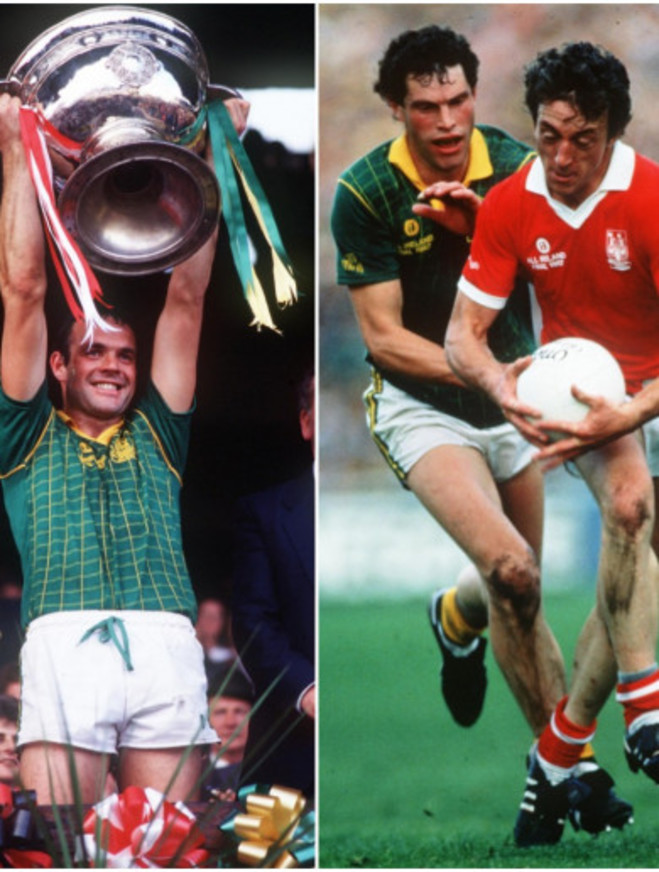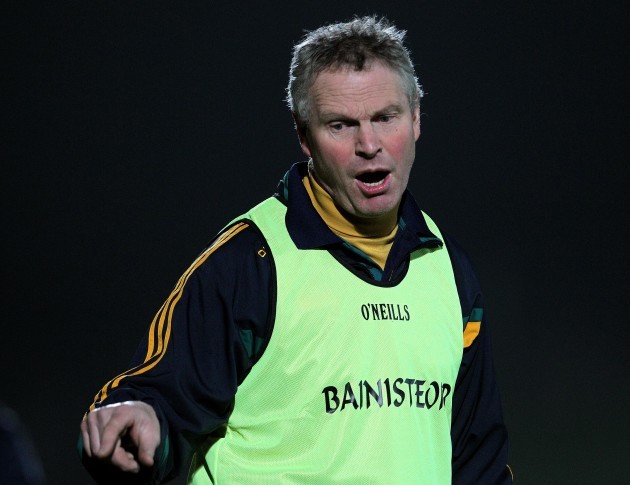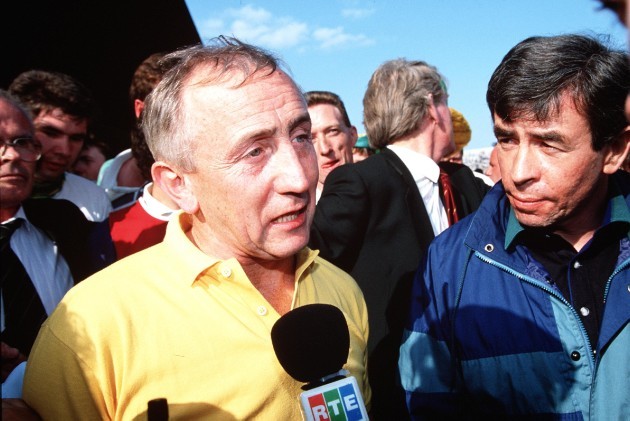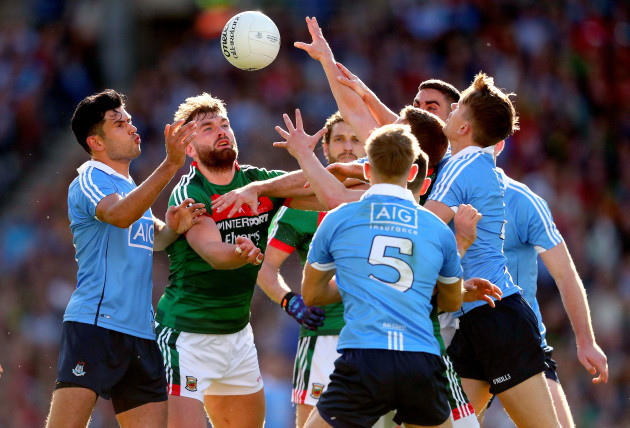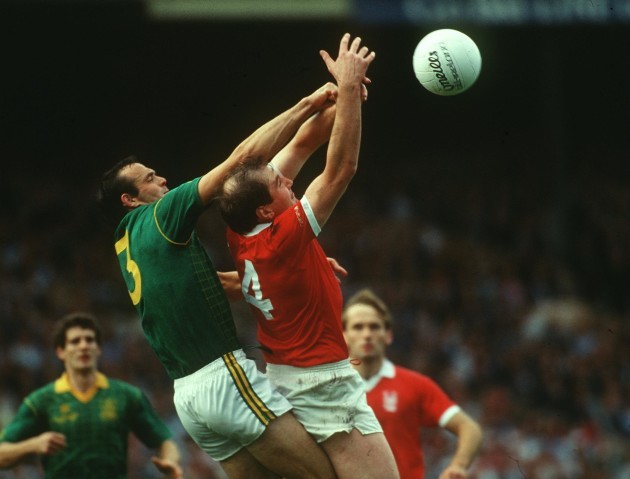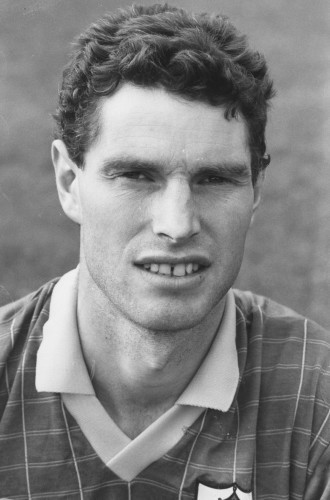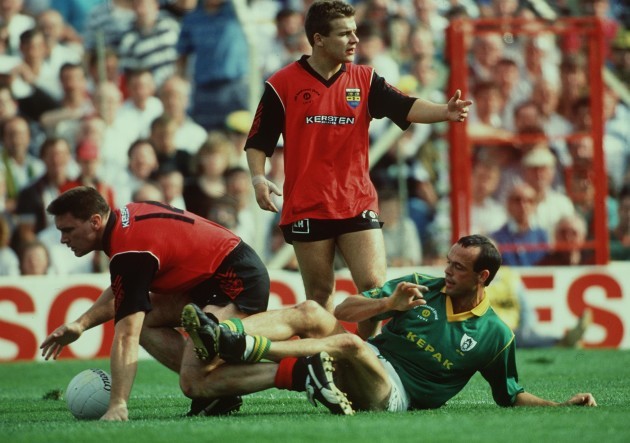“I WAS TALKING to Mick,” says Liam.
“Right,” I say, assuming the worst. “What’s he thinking?”
“He’s very excited.”
Nobody does droll like Liam Harnan. I first knew him when he managed my home club, Maynooth, to an Intermediate Championship in 2005. Harnan’s reputation, like all Meath footballers of his generation, preceded him like a red carpet, except the colour had as much to do with pugnacity as with pageantry.
Even then, long since retired from playing the game, he carried immense physical presence. Maynooth is not far from Moynalvey – 15 minutes by car – but Harnan belonged to a different world. A dairy farmer, he could smell bull 10 fields away. His back looked longer than his legs.
“You’re like a gun with one bullet,” he railed one night. “Bang — and that’s it.”
Another time, he landed into Brady’s pub, a hub for truant footballers. Maynooth had the talent to play Senior but the tide, each time we won Intermediate, went out. Invariably, too many good players went with it.
Harnan could be the thickest man on any sideline but nobody’s fool. Good forwards were too precious to spend training nights without them. He waded into Brady’s pursuing reluctant talents. One target confessed lack of interest. In fact, said he to Harnan, best to look elsewhere.
“I’d rather chase thoroughbreds than donkeys,” came the swift reply.
With this motto in mind, I sounded out an interview before this year’s Leinster Final.
“It’s a possibility,” Harnan said.
Then I ventured further. Could he convince Mick Lyons – cousin, fellow warrior, ruler of defence – to come too.
“It’s a possibility,” he slowly repeated.
Further soundings were not promising, though. Next I spoke to Liam, he suggested that I call Mick myself.
“He might not answer the phone now,” Harnan warned.
A rock and a hard place. Where else could you be with two Meath men?
“Better you ring, Liam, and ask him out straight,” I suggested.
When Harnan called with news of Mick’s ‘excitement’ the following day, I presumed this piece would not come to pass. But the barter system does not hold if it does not yield an occasional bargain.
Here is how it went with Mick Lyons and Liam Harnan, former titans at number three and number six, over a pint in Shaw’s of Summerhill.
***************
ML: To me, Liam was a very underestimated footballer. Other teams used categorise us as the same. They didn’t actually look deep enough to see what was there. When Liam got a ball, it was always going to go to the right lad.
BC: And his personality?
ML: You’d have to know Liam. Liam is black and white. If he likes you, he likes you. If he doesn’t like you, he doesn’t fucking like you.
LH: The door is always open. You just have to come in.
ML: And if you don’t like what’s in there, you can get out.
LH: Probably the first action I seen of Mick on the field was fighting with St Vincent’s lads over in Newbridge [1977, Leinster SFC Club Final, which Summerhill won] when he was only a sub. We wouldn’t have seen much of each other as cousins at all. Our paths crossed more in the nightclub in Trim. There’d be an odd row but we’d be on the same side in there.
ML: I got very hard to get on the Senior team in Summerhill. I wasn’t a good minor.
LH: I played with Moynalvey and we were relatively successful. We got up to Senior in ’84. Summerhill and Moynalvey are the bedrock of the GAA. It’s a neighbouring rivalry.
ML: Even now, when Summerhill would play Moynalvey, there’d be a certain edge to it. Summerhill would rise their game for Moynalvey and they could never afford to take Moynalvey for granted.
LH: We were the noisy neighbours.
ML: We never came to blows. It’s a bit like Meath and Dublin. People from outside would have thought we hated each other, and the crowd would have loved that, but at the end of the day, players don’t. If you got a half chance to do two things together at the one time, you’d do it. That was the law of the land, and if you got caught, so be it. The word ‘hate’ is too strong.
LH: Mick impressed me in ’83. There was a stoutness about him. There was a nice old-fashioned feel to it. I was at home, farming. I played minor for three years with the county and lost an All Ireland Final in ’77. Obviously, I thought it was going to be easy after that and drifted away. I don’t have any great recollection of U21 football. I was having a good time, playing club football, a bit of soccer, and out drinking. I attended a few trials and nothing happened. It was my fault. I didn’t see any real future in it.
ML: Nobody wanted the Meath manager’s job. We were no good. I’d say we – as in myself, Colm [O’Rourke], Gerry [McEntee], Joe Cassells – I’d say we were very near the end of the conveyer belt and into a skip. We had been there for a good few years and nothing happening. And then it all changed.
LH: In the very late ’70s until that drawn game with Dublin [Leinster SFC quarter final] in ’83, Meath were in the doldrums.
ML: We played Dublin in Navan one day. They beat us but early on we were staying with them. Well, I’m not codding you, the second half started and they just physically obliterated us. After that, we knew we needed to do something serious to catch up. In fairness to Seán Boylan, he did that. Seán said one time: ‘The first thing you do is get fit.’
LH: And see where it takes you.
ML: We got hockeyed by Laois in ’85 and that was probably the best thing that ever happened us, because it got rid of the lads who didn’t want to go to war.
LH: Meath played Cavan in Dunshaughlin on the morning of the All Ireland Final in 1985. I was within that much of telling Seán I wasn’t arsed. For whatever reason, I went.
ML: We were lucky in Meath. A lot of things fell together.
LH: There was a different vibe about the whole thing then compared to the previous times when I had been in with the panel. In ’85, I was 24. You’d want to be getting a bit of sense at that stage. Like, how many more times were they going to ask me to come in?
ML: I would have seen the way Summerhill were rising, when I knew things were going to happen. And I watched it going downhill too, when I knew we were gone. I could sense, as Liam says, the same with Meath. I could see that we were getting nearer and nearer.
LH: Maybe it’s just cyclical. It’s up and then it’s down. Maybe it’s going to get up again now.
ML: We were lucky in ’86. Laois were a very good side then. They went down to play Wicklow in Aughrim and got turned over. Laois were better than Dublin at that stage. And they could play either way you wanted to play.
LH: Dublin were no great shakes in ’86 either. They were probably vulnerable.
ML: We had to be a lot better than Dublin to beat them.
LH: Dublin were as close to us as any team but we’d get the breaks. Go back to ’91 and we should have been beaten three times. They were maybe four or five points a better team. That’s the effect of being champions. To beat a champion, you cannot only be better by one point.
ML: When it gets down to the crunch is the real time for lads not to make mistakes and to do the right thing. That’s when you know you have a proper team.
LH: It took two years for me to win an All-Ireland, going from the autumn of ’85. It’s a big jump alright. It probably just happens and you don’t think about it too much. There was an assumption after losing the semi final in ’86 that we were the coming team.
ML: After that we knew, whether it was ’87 or not, we were going to win an All-Ireland. The training was different then. No messing. You knew in training that it was going to take a fair team to beat us. It was a very easy squad to run when it was going right.
LH: It was self governed and well oiled.
ML: It wasn’t that 15 lads wanted to do it and the other lads weren’t sure. They all wanted to do it and they all knew the consequences if they didn’t do it. I’m sure Dublin are the same now. Dublin will get harder challenges and harder matches among themselves.
LH: Everyone knew when fellas were slacking and everyone knew when everyone was putting it all in.
ML: If we were racehorses, you’d know that some of us would be handicappers and some would be sprinters.
LH: And some of us needed to be put down.
ML: You got your pecking order in the training.
BC: Where were you and Liam?
ML: I’d say we were National Hunt.
LH: And it’d be soft going. We had other lads to send to The Curragh.
ML: All you have to do is push yourself as hard as you can. When you push yourself to the limit, you can’t go any further than that.
LH: If Terry Ferguson was running 50 yards in front of us, it was as hard for him to do that because that was his level.
ML: That team was very competitive even among ourselves. You didn’t want to be out the back. If you can push yourself in training, you’ll do far better in the big matches because you’ve got adrenaline to push you on.
LH: If you’re doing the sand dunes and there’s someone coming behind you, and he’s going to pass you out, you’ll have a go at trying to keep up with the next fella.
ML: Without Seán Boylan, we’d have had nothing. That’s it in a nutshell. Isn’t it, Liam?
LH: Seán was the glue.
ML: If Seán was a horse trainer, he’d be very well off. He was very good at having you right at the right time.
LH: Seán was a man manager but he knew the body.
ML: Playing inter-county football, there’s very little difference between getting turned over and winning your own war because it’s marginal. Little things will change a game. You have to back yourself. I liked the cut and thrust of it.
LH: I dreaded matches. I’d always be marking the top players. When things were going bad and you were struggling, it was horrible.
ML: When things are going bad, it was a great time to readjust. If you’re a good side, you will turn it around.
LH: Yeah, work away and figure it out.
ML: You cannot panic for a start.
LH: Stop the hole getting bigger.
ML: Any team that has to wait to go into the dressing room at halftime is not a team because the team itself should have four or five lads that’s able to figure it out. I haven’t seen this current Dublin team tested often enough to say how many leaders they have. I’m not saying Dublin are not a good side. The only team that was able to put Dublin to the pin of their collar was Mayo. At the moment, there’s nobody able to take on Dublin.
LH: It’s hard to go to games now because supporters would be saying to you: ‘If only you were out there.’ And when I was playing they were saying: ‘What’s that fucker still doing out there?’
ML: If someone gave me a job to sort it out, I wouldn’t be able to do it. All I know is you must work with the young ones you have.
LH: If Dublin can keep enough people at the top to drive it from the bottom up…
ML: They’ll finish football in Leinster.
BC: Mick, what was it like for you to bring Sam Maguire back to Summerhill in 1987?
ML: I never looked upon myself as the man bringing Sam back to Summerhill.
LH: I would agree with Mick on that. It wasn’t a Summerhill thing. Mick was captain and this was the route home. Probably that was the strength of the team. All the players from the different clubs gelled.
ML: I was a reluctant captain anyway.
LH: There was no bitterness. Fellas might have begrudged that they weren’t playing but that’s an obvious necessity. You’d have to be, if you weren’t picked. It was a Meath team under a Meath flag and that was it. Didn’t matter who was picking up the cup.
ML: At that time, the Meath supporters were starved of following a team. And then this team got going and it was like a fire out of control. We were very lucky to play in four All Ireland (All-Ireland) Finals.
LH: A lot of people went to work on the Tuesday after winning the All-Ireland in ’87. We came back to Navan on the Monday and everyone had to make their own way home. A neighbour of mine was in there and gave me a lift.
ML: It’s nice to get home, that’s what I found. I used to have enough of it. The weekend after the All-Ireland you’d be mad to get out again.
LH: It was a recessionary time as well. The mid ’80s, there was plenty of emigration then. The money wasn’t plentiful. I remember a few lads from Moynalvey were off in Australia and that’s why they were there.
ML: We were like gunslingers. If you got shot, wheel him away.
LH: There would have been a secret admiration of Meath within Ireland, a lot of people wouldn’t admit to it.
BC: Con Houlihan once wrote: I wouldn’t be surprised to hear that there are small boys in Dublin who believe that Mick Lyons is kept in a cage above in Summerhill and fed with raw meat.
ML: I remember that. At the end of the day, you can write an article and that’s your opinion. I wouldn’t have time for that. I’d be too busy working. I certainly didn’t see myself the way the media made me out to be.
LH: Mick was always cool and he had a belief in what he was doing. And that principle of his was a constant. It didn’t always work but the constant was the belief. And it wasn’t an arrogant belief.
ML: You just have it or you don’t. That team had it.
LH: I wouldn’t have had the same belief that you had.
ML: Would you not, Liam?
LH: Even in your business life and things like that. I know there’s been a sad ending to it (Rathcore Golf Club, which Lyons established in 2004, was put up for sale in 2017) but you had great foresight. Things didn’t happen overnight for you.
ML: No.
LH: You built and you built and you became more successful and you built on again. I would admire that. I know the last project it was a timing issue. No matter how long it took you to build Rathcore [Golf Club] it was going to be perfect. There was no such thing as ‘Let’s cut a corner here’. That’s the way he played football, I would say. There wasn’t an arrogance about him the way Colm O’Rourke would have had. That was good for Colm. That was his personality and he did back it up.
ML: I wasn’t good enough to have an arrogance about me.
LH: But you had a belief in you.
ML: Both of us had to work terrible hard to survive at that level.
LH: I was more limited. What was good was good but a lot of things… I was slow as a fucking boat.
ML: Liam had a good sense of where the ball was going to be. And we both played behind a very good midfield. If we were exposed, then the whole thing was going to break down. I always said Bob O’Malley was a Rolls-Royce corner back. He wasn’t a full back, he wasn’t a centre back, he wasn’t a wing back. He was a corner back in that era. Bob O’Malley could stand 10 or 15 yards in front of his man. I couldn’t live like that.
LH: You had a man to mark. The games were won and lost on match ups.
ML: My parents got a great go of football. They got 10 years with Summerhill and they got another 10 years following Meath. They got 20 years of massive entertainment.
LH: The highs probably weren’t as high as some people expected but then the lows weren’t as low, although ’91 was definitely a low low. To lose the All-Ireland final at the end of it all… You know Tottenham thought their name was on the cup but so was Liverpool’s. One team was not going to have a honeymoon.
ML: You play in your era, you do what you can and if you’re lucky enough to win All-Irelands then brilliant. But when that chapter is closed you just move it on.
LH: What more can you do when you win it? Meet up on the Monday. What more is there to get from it? It’s a game of football.
ML: You think with the county lads that you’ll see them forever but you don’t. That’s the way it goes. You get married and have kids. A club is always there. You can’t keep playing county football. You’ll either be dropped or you’ll be destroyed. Either way, it will be a bad ending.
LH: Winning an All-Ireland probably wasn’t life changing and that’s the good part about it. It should be life changing for an hour or a day or a weekend but after that it’s still only a game.
The42 is on Instagram! Tap the button below on your phone to follow us!
